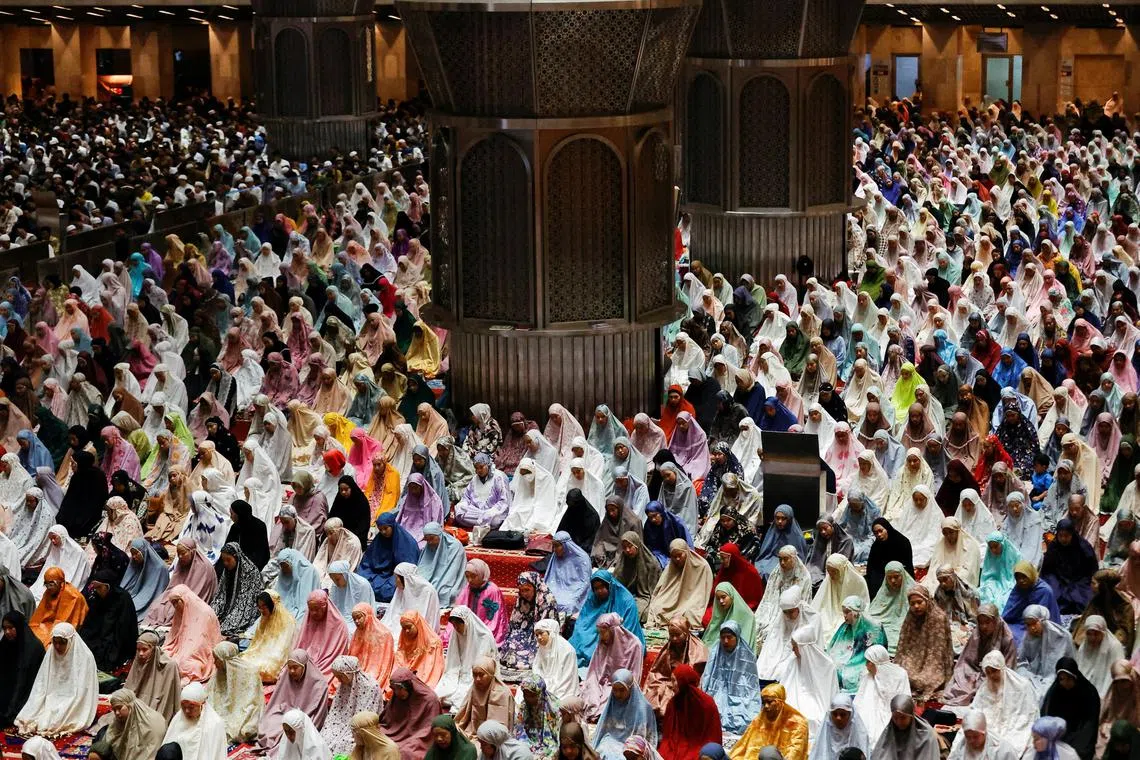Indonesian government faces backlash over ban on civil servants gathering to break fast
Sign up now: Get insights on Asia's fast-moving developments

Some political parties have defended the policy, which seems to be targeted at lavish gatherings during Ramadan.
PHOTO: REUTERS
JAKARTA – Indonesia has disallowed gatherings by civil servants for the breaking of fast during the fasting month of Ramadan, a move that has triggered backlash from several Islamist political parties.
In a circular signed by Cabinet Secretary Pramono Anung, Indonesian President Joko Widodo was cited as saying that the move was necessary as the country is still transitioning from the pandemic to an endemic Covid-19 situation.
“The Home Affairs Minister is expected to forward this instruction to governors, regents and mayors,” said the circular dated March 21, a copy of which was widely shared online on Thursday.
Media reports said the letter was addressed to Cabinet ministers and other senior officials, including the national defence force commander, national police chief, attorney-general and other institutional leaders.
During the month of Ramadan, which this year falls from March 23 to April 22, Indonesian Muslims from all walks of life gather for buka bersama, or bukber – the breaking of fast together after fasting from sunrise to sundown. This practice, however, was stopped in compliance with safe distancing regulations during the pandemic.
Some of these gatherings, including by high-ranking officials at private homes or official residences, would include expensive catering from hotels, on-site food preparation stations, and entertainment options like karaoke.
Mr Pramono made some clarifications on his official YouTube channel on Thursday, stressing that the directives are only for coordinating ministers, ministers and heads of government agencies. The ban does not apply to the public, he said.
“Government officials are currently in the spotlight (for leading lavish lifestyles), hence the President asked the government officials to hold breaking-of-fast gatherings in a humble way, not inviting any high-ranked officials when they hold a breaking-of-fast gathering,” he added.
He was referring to the ongoing crackdown on lavish displays of wealth by tax officials. An assault allegedly perpetrated in late February by the flashy son of a mid-level tax official has renewed debate about the sources of wealth of some of the country’s highest-paid civil servants, and stirred calls among netizens to boycott the filing of income tax.
As at Friday, ministries and senior officials seem to be observing the new directives. Indonesia’s Health Ministry, for example, has directed its staff to avoid hosting group iftar – breaking of fast – sessions during Ramadan.
Commenting on the ban on gatherings, Health Minister Budi Gunadi Sadikin said: “I see the stress is more on government officials to promote humble living.”
Some political parties have defended the policy.
The Jakarta Post reported on Friday that the National Mandate Party (PAN) said the move was not meant to discriminate against the Muslim community.
“President Jokowi is banning officials from the central to regional governments from holding iftar gatherings. This is not a blanket ban on iftar gatherings held by the public,” said PAN secretary-general Eddy Soeparno.
“Don’t make it (out) as if the people are banned from holding iftar gatherings,” he added.
But the move has attracted some criticism from Muslim groups which say the directive is biased against the Muslim community. These groups have pointed out that pandemic curbs were gradually eased until they were fully lifted at the end of last December, and that events which draw big crowds – like concerts, exhibitions and weddings – have been taking place.
Dr Yusril Ihza Mahendra, leader of the Crescent Star Party (PBB), a small pro-government Islamist party, has called on the Cabinet Secretariat to revise the circular and allow civil servants to hold iftar gatherings.
“I am concerned that the policy will be used as a pretext to discredit the government and accuse the Jokowi administration of being anti-Islam,” he said in a statement on Thursday.
Dr Din Syamsuddin, chairman of the Pelita Party, also criticised the policy.
“It is unwise... It is as if the meaning and purpose of an iftar meal (are not understood). It is about strengthening friendships, which could actually improve the performance of civil servants,” said Dr Din, a former chairman of Muhammadiyah, the country’s second-largest Muslim organisation.
Health professionals are also divided on the ban, and Dr Pandu Riono, an epidemiologist, pointed out that the government has lifted social restrictions. “The issue is the circular cites the pandemic as a reason, which is no longer relevant,” he said.


